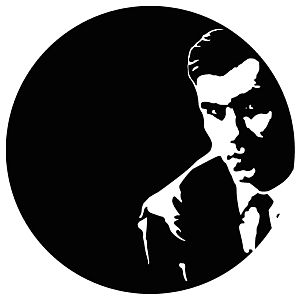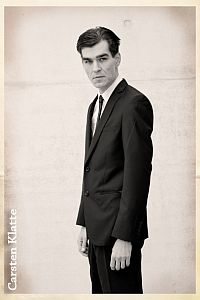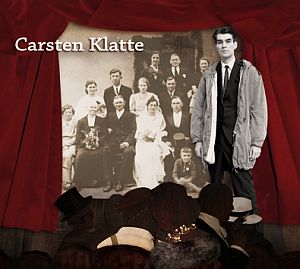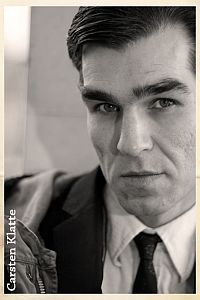 Interview with
Interview withCarsten Klatte
Just recently in March, CARSTEN KLATTE, who's familiar to many as being live guitarist for PROJECT PITCHFORK or PETER HEPPNER, has released the first album under his own name The new album brought up a few questions and Carsten was more than willing to clear things up for us.
Reflections of Darkness (RoD): Is that really the first release under your real name or are there already more and I just couldn't find them?
Carsten: Well, there are actually 4, titled with the alias LA CASA DEL CID. All those albums ('Soul Eclipse', 'Lonestar', 'Who killed Barbie' and 'M-orpheus') are solo albums since I was the only person involved in their engineering process. Looking at it from this perspective, 'Carsten Klatte' is anything but my first album. My very first release was a split single by the way and I was drummer in a punk band. Our names was THE NIKOTEENS and our song 'It's just another kind of death’, but that was a long time ago; I think it was around 1987.
 RoD: Is the simple titling of the album with your own name to clarify it reflects the person, or particularly the different facets of the person Carsten Klatte in a proper way?
RoD: Is the simple titling of the album with your own name to clarify it reflects the person, or particularly the different facets of the person Carsten Klatte in a proper way?Carsten: Yeah, if you like. The thing is that my music, which means the world to me now and thus comes along just as existential, got very close to me or better I got closer to it. There's no gap in-between anymore, not even a thought fits between me and my music. That's why it's gotten obsolete to maintain a profile. I've got nothing to profile; I'm making music.
RoD: Why the decision, releasing the album under your own name anyway?
Carsten: Because I was born to this world by a physical mother, that being said, what sort of person I am. I've got an ID with a number like anyone else. Might seem a bit sobering, because it's not colourful or “cinemascope” but that's just the blues. I had a time in my life about a year ago, figuratively speaking, when sort of sold my soul to the devil for the blues - just as the Afro American musicians did in the 1920s. They did it because they were tired of the white man and the devil within the cult of the white man was the one to be the opponent of the white man. So it was clear for them they'd become friends with the arch enemy of the white man. The cult, coming to life afterwards, was named Hoodoo and is actually what the cliché German people know as Voodoo. I think I was standing at a similar crossroad, where I was tired of the things concerning the white man's game. But since I'm a white man myself I could only remove the mask or the glasses myself and see what's left.
 RoD: How long have you been working on the songs of the album and how did you find the time between all your activities?
RoD: How long have you been working on the songs of the album and how did you find the time between all your activities?Carsten: The entire album took about 2 years, a long time for an album, I think. In this case it was the song writing taking a whole year. I had worked before on 'Who Killed Barbie?' in 2006 and I've been really satisfied. I didn't just want to re-invent the wheel again but taking the next regular step with the next regular album. I felt a need for growth and that took 2 years then.
RoD: Is there a so called golden threat, permeating the album lyrically, or is it a collection of stories you're telling?
Carsten: Well, I would call them thoughts. A text is a way of dealing with things. Maybe you could even call that philosophy. But if you do only in the most antique sense after the motto “Hey I'm doing it this way and you're doing it that way.” In another interview I tried the term “Song lines” as in something you can make your way hand over hand along in life.
RoD: While we're at it. Where does the inspiration for your songs come from? That's a thing differing from artist to artist.
Carsten: I think of myself as an individual person. I reflect my world, or the share I have, with my eyes and I try to remain “straight” while doing that and if I succeed a song comes out.
 RoD: The concluding song of the album 'Who can see' moved me deeply with its entire mood. That s why I have a special interest to know what this song's about.
RoD: The concluding song of the album 'Who can see' moved me deeply with its entire mood. That s why I have a special interest to know what this song's about.Carsten: 'Who Can See' is attached to a dedication to Mr. Gregory Mc Cormick aka “Itchy”, singer of the band SHOCK THERAPY who passed away in 2008. Itchy, to cut a long story short, was in prison for 4 years, a time that supposedly broke him since he was dead 9 months after leaving it. I had a few correspondences with him and contributed to a charity CD and so had a chance to get to know him a little. Just two days had passed since when I heard about his death and it felt like he was spooking between worlds. That's what song lines are there for also: To help someone on their “journey”. That's how 'Who Can See' came about.
RoD: On a related note, why did you choose that song to be the last song on the album
Carsten: Because I found the circle was closed then.
RoD: Any plans for shows to present the songs in a live circuit?
Carsten: Shows are scheduled and more dates are in the works. Just stop by at www.myspace.com/carstenklatte. If there's anything new, it'll be posted there. Currently there are also concerts on schedule, amongst others a showcase within the scopes of "MySpace Indie Top 100" at Markthalle in Hamburg on 15th May 2010. But the best thing is you check the site regularly and have a look at what we're booking over the year.
RoD: Anything else you'd like to add?
Carsten: I want to thank you for you for your sincerity for me and my music, and I'd like to thank the people who have kept and are still keeping the taste, their own opinion, maybe some style, tolerance and joy because laughing is our best weapon against the evil.
{jos_sb_discuss:21}






Comments powered by CComment